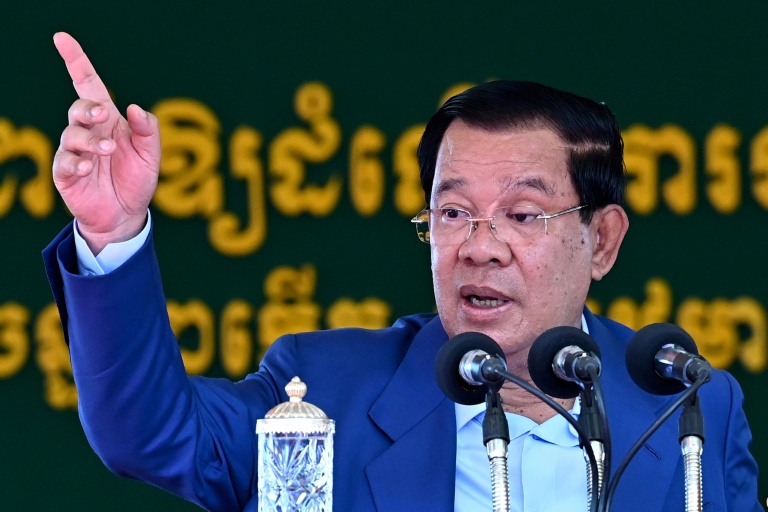SOCIAL
Cambodian PM Hun Sen dumps Facebook on eve of poll campaign

Cambodia’s longtime Prime Minister Hun Sen vows he will no longer post on social media giant Facebook, saying he will use Telegram and TikTok instead as he ramps up his latest re-election campaign – Copyright AFP Nhac NGUYEN
Cambodian leader Hun Sen, a prolific Facebook user, vowed on Thursday to quit posting on the popular social media platform, days before he launches a re-election campaign.
Facebook announced Thursday it would be removing one of Hun Sen’s videos in line with a ruling by its independent Oversight Board, which said the video contained “unequivocal statements of intent to commit violence” against his political opponents.
Cambodia will go to the polls on July 23 in an election that has been widely dubbed a sham after authorities denied registration to the chief challenger to Hun Sen’s ruling Cambodian People’s Party.
Hun Sen is among the world’s longest-serving leaders and, after 38 years in power, is on the cusp of retiring. His son Hun Manet is slated to lead the kingdom in the future.
Hun Sen announced he will now use the Telegram app to relay his political messages to supporters, and TikTok to engage with youth.
“From now on, I will no longer post on Facebook,” Hun Sen told thousands of garment workers at an event.
His Telegram channel has 860,000 followers and he has ramped up activity in recent months, posting pictures and political messages.
Hun Sen, who will kick off his re-election campaign on Saturday, said the Telegram app was “more efficient compared to Facebook”.
His Facebook page — which remains online — was launched in 2015 after his opponents, particularly exiled opposition leader Sam Rainsy, used the platform to successfully reach younger voters.
It has 14 million followers but the account has been dogged by allegations that a significant chunk of fans come from “click farms” — networks of fake and real users controlled by digital middlemen who sell likes.
Hun Sen’s move away from Facebook came as the Oversight Board for Meta, Facebook’s parent company, recommended his Facebook and Instagram accounts be suspended for six months due to a video where he is seen threatening to beat up opposition politicians.
In January, Hun Sen warned opponents that they would face legal action or a beating with sticks if they accused his party of vote theft in July’s national polls.
Meta’s Oversight Board, an independent panel funded by the company and whose decisions are binding, on Thursday overturned the social network’s decision to leave the video up based on “newsworthiness” and recommended the six-month ban on Hun Sen’s accounts.
“Given the severity of the violation, Hun Sen’s history of committing human rights violations and intimidating political opponents, as well as his strategic use of social media to amplify such threats, the Board calls on Meta to immediately suspend Hun Sen’s Facebook page and Instagram account for six months,” an Oversight Board statement said.
Hours later, Meta said it would comply with the decision regarding removing the content.
“We will conduct a review of all the recommendations provided by the board in addition to its decision, and respond to the board’s recommendation on suspending Prime Minister Hun Sen’s accounts as soon as we have undertaken that analysis,” said a statement.
– ‘High stakes’ –
Sebastian Strangio, the author of “Hun Sen’s Cambodia”, said the timing of Hun Sen’s withdrawal indicated it was likely a preemptive response to the Oversight Board’s decision.
“Otherwise, Hun Sen’s social media pivot to Telegram and TikTok seems to reflect the broader trajectory of Cambodia’s foreign policy over the past two decades: away from the West, and toward China and Russia,” he told AFP.
“Based on their track record, it is much less likely that these two platforms will restrict Hun Sen from using them as he sees fit, including as a vehicle for baiting, goading, and threatening his opponents.”
On Thursday, Human Rights Watch (HRW) said the move was a “face-off between Big Tech and a dictator over human rights issues” that was “long overdue”.
“The stakes are high because plenty of real world harm is caused when an authoritarian uses social media to incite violence — as we have already seen far too many times in Cambodia,” HRW’s Deputy Asia Director Phil Robertson said.
Rights groups also accuse Hun Sen of using the legal system to crush opposition.
Hun Sen’s party won every seat in the 2018 national election after the opposition Cambodia National Rescue Party was dissolved.















